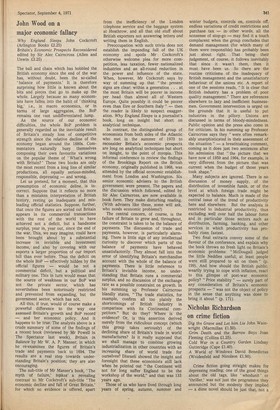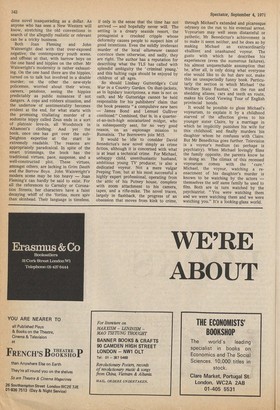Nicholas Richardson on crime fiction
Dig the Grave and Let him Lie John Wainwright (Macmillan £1.50).
Grim Death and the Barrow Boys Joan Fleming (Collins £1.25).
Cold War in a Country Garden Lindsay Gutteridge (Cape £1.40).
A World of Windows David Benedictus (Weidenfeld and Nicolson £1.90).
Crime fiction going straight makes for depressing reading; one of the good things about the old tags, like ' whodunit ' or 'thriller,' was not just the programme they announced but the modesty they implied — a dime novel should be just that, not a dime novel masquerading as a dollar. As anyone who has seen a New Western will know, stretching the old conventions in search of the allegedly realistic or relevant can be a tricky business.
Both Joan Fleming and John Wainwright deal with that over-exposed negative, the contemporary youth scene, and offbeat at that, with barrow boys on the one hand and hippies on the other. Mr Wainwright's modernity is rather exhausting. On the one hand there are the hippies, turned on to talk but involved in a double murder; on •the other the new-style policemen, worried about their wives, careers, pensions, seeing the hippies predictably as public nuisances if not dangers. A cops and robbers situation, and the undertow of sentimentality becomes evident at the end, for what starts with the promising titallating murder of a sodomite hippy called Zeus ends in a sort of platonic love-in, all Woodstock in Altamont's clothing. And yet the book, once one has got over the subDeighton expertise at the start is extremely readable. The reasons are appropriately paradoxical. In spite of the smart trimmings, the book has the traditional virtues, pace, suspense, and a well-constructed plot. These virtues, amongst others, are lacking in Grim Death and the Barrow Boys. John Wainwright's modern scene may be too heavy — Joan Fleming's can hardly be said to exist. For all the references to Carnaby or Coronation Streets, her characters have a faint decaying whiff of the 'forties, more spiv than skinhead. Their language is timeless,
if only in the sense that the time has not arrived — and hopefully never will. The setting is a dreary seaside resort, the
protagonist a crooked cripple whose deformity causes people to suspect him of good intentions. Even the mildly irrelevant murder of the local allumeuse cannot convince them otherwise, and sadly, they are right. The author has a reputation for describing what the TLS has called with splendid ambiguity the 'criminal young,' and this halting saga should be enjoyed by children of all ages.
So should Lindsay Gutteridge's Cold War in a Country Garden. On dust-jackets, as in lapidary inscriptions, a man is not on oath, and Mr Gutteridge cannot be held responsible for his publishers' claim that the book presents "a compulsive new hero — James Bond and Lemuel Gulliver combined." Combined, that is, in a quarterof-an-inch-high miniaturized midget, who is subsequently sent, for no very good reason, on an espionage mission to Rumainia. The Borrowers join M15.
It would be idle to consider David Benedictus's new novel simply as crime fiction, although it is concerned with what is at least a technical crime. For Michael, unhappy child, unenthusiastic husband, ambitious young TV producer, is also a dedicated voyeur. Not a mere vulgar Peeping Tom, but at his most successful a highly expert professional, operating from the attic of his Putney house, complete with zoom attachment to his camera, tapes, and a rifle-mike. The novel traces, largely in flashback, the progress of an obsession that moves from kink to crime, through Michael's extended and picaresque odyssey on the run to his eventual arrest. Voyeurism may well seem distasteful or pathetic, Mr Benedictus's achievement is to make it seem neither, and he does so by making Michael an extraordinarily ebullient and unashamed voyeur. The gusto with which he describes his experiences (even the numerous failures), his almost unquenchable assumption that he, after all, is only doing what everyone else would like to do but dare not, make this an unexpectedly funny book. Particularly the section in which Michael 'the Welfare State Faustus,' on the run and shedding aliases, cars and teeth en route, makes his Good Viewing Tour of English provincial hotels.
It would be possible to gloss Michael's voyeurism, to explain it by a childhood starved of the affection given to his younger sister Claire, by a marriage in which he implicitly punishes his wife for this childhood, and finally murders his daughter whom he confuses with Claire. But Mr Benedictus goes further. Television is a voyeur's medium (so perhaps is psychiatry). When Michael lovingly films the family opposite, the parents know he is doing so. The climax of this recessed voyeurism comes with the ' cure.' Michael, the voyeur, watching a reenactment of his daughter's murder is known to be watching by the actors — themselves the self same family he used to film. Both are in turn watched by the psychiatrist. "You were watching them and we were watching them and we were watching you." It's a looking-glass world.



































 Previous page
Previous page